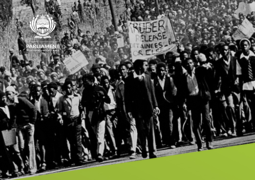
This year South Africa observes the 43rd anniversary of the 16 June 1976 uprising of the youth of Soweto, which changed the course of the country’s history. We remember this day as a moment in history that is as remarkable as it is courageous. Members of Parliament shared their views on the significance of this commemorative day and made suggestions on how best to remember the convictions of those young people.
“Given that Parliament is the highest point of policy making,” remarked Member of Parliament Mr Lisa Mangcu, “it should agitate for policies that would create jobs for the youth and must advance policies that would introduce employment quotas in favour of the youth in both the public and private sector … The rural youth should not be left behind, as is normally the case.”
Much needs to be done to educate them “about the job opportunities that can be derived from the agricultural sector and its value chain,” Mr Mangcu continued. But what is needed most is to ensure that Parliament come up policies that “will not push them to employment, but that would turn them into employment creators instead”.
Mr Elphus Mathebula believes that June 16 should be used to “conscientise the youth of today about the significance of this day and what is expected of them as future leaders … a youth ministry is needed to ensure that youth issues are accorded the attention they deserve and expedited accordingly.”
Currently, he said, youth issues are placed in different government departments’ portfolios and it is difficult for the youth to access and understand how each of these portfolios function and what are their respective mandates.” As a result, as things stands now, there is no coordinated manner of dealing with youth issues. This has frustrated the youth and has created an impression that government does not take issues seriously, he said.
Mr Lawrence Edward, believes that the rising youth unemployment rate in this country can be attributed to their lack of work experience and their inactivity in the mainstream economy. The best way to deal with the former is to ensure that “the youth is upskilled for the world of work. Recent government policy to waver the need for experience in lower-level jobs is a step in a right direction.”
But this is not enough, he added: “Parliament should introduce policies that will ensure that the youth get a certain quota from government contacts.”
“I am of the view,” said Mr Mkhuleko Hlengwa, “that in this term of the 6th Parliament the idea of a Multi-Party Youth Caucus needs to be resuscitated.” This to ensure that “youth’s participation in politics can no longer be confined to political affiliation. Parliament should also play a meaningful role in uniting the voice of the youth on job creation, free education and the fight against drug abuse.
“If well constituted, this caucus would be a platform to share ideas, inspire hope and confidence in youth, critical issues that the Youth Parliament has failed to achieve over years.”

